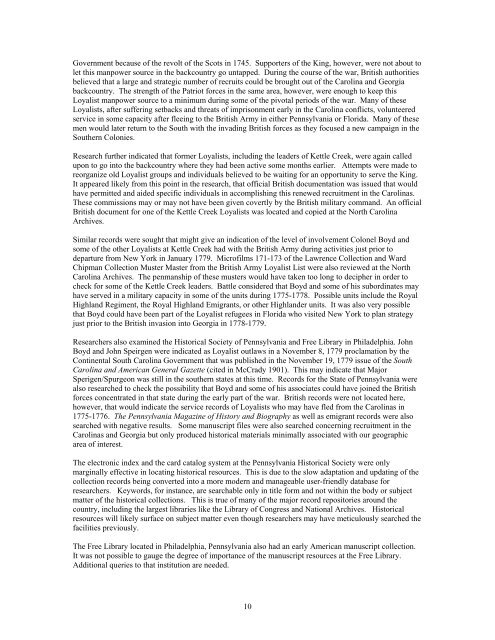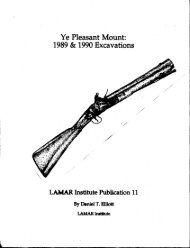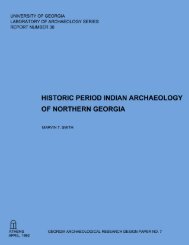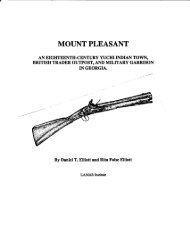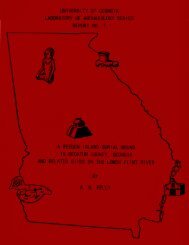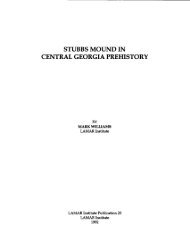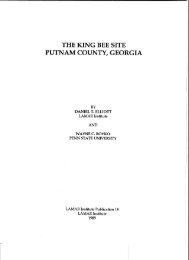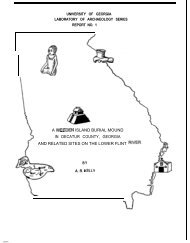Stirring Up a Hornet's Nest: - UGA Laboratory of Archaeology ...
Stirring Up a Hornet's Nest: - UGA Laboratory of Archaeology ...
Stirring Up a Hornet's Nest: - UGA Laboratory of Archaeology ...
You also want an ePaper? Increase the reach of your titles
YUMPU automatically turns print PDFs into web optimized ePapers that Google loves.
Government because <strong>of</strong> the revolt <strong>of</strong> the Scots in 1745. Supporters <strong>of</strong> the King, however, were not about to<br />
let this manpower source in the backcountry go untapped. During the course <strong>of</strong> the war, British authorities<br />
believed that a large and strategic number <strong>of</strong> recruits could be brought out <strong>of</strong> the Carolina and Georgia<br />
backcountry. The strength <strong>of</strong> the Patriot forces in the same area, however, were enough to keep this<br />
Loyalist manpower source to a minimum during some <strong>of</strong> the pivotal periods <strong>of</strong> the war. Many <strong>of</strong> these<br />
Loyalists, after suffering setbacks and threats <strong>of</strong> imprisonment early in the Carolina conflicts, volunteered<br />
service in some capacity after fleeing to the British Army in either Pennsylvania or Florida. Many <strong>of</strong> these<br />
men would later return to the South with the invading British forces as they focused a new campaign in the<br />
Southern Colonies.<br />
Research further indicated that former Loyalists, including the leaders <strong>of</strong> Kettle Creek, were again called<br />
upon to go into the backcountry where they had been active some months earlier. Attempts were made to<br />
reorganize old Loyalist groups and individuals believed to be waiting for an opportunity to serve the King.<br />
It appeared likely from this point in the research, that <strong>of</strong>ficial British documentation was issued that would<br />
have permitted and aided specific individuals in accomplishing this renewed recruitment in the Carolinas.<br />
These commissions may or may not have been given covertly by the British military command. An <strong>of</strong>ficial<br />
British document for one <strong>of</strong> the Kettle Creek Loyalists was located and copied at the North Carolina<br />
Archives.<br />
Similar records were sought that might give an indication <strong>of</strong> the level <strong>of</strong> involvement Colonel Boyd and<br />
some <strong>of</strong> the other Loyalists at Kettle Creek had with the British Army during activities just prior to<br />
departure from New York in January 1779. Micr<strong>of</strong>ilms 171-173 <strong>of</strong> the Lawrence Collection and Ward<br />
Chipman Collection Muster Master from the British Army Loyalist List were also reviewed at the North<br />
Carolina Archives. The penmanship <strong>of</strong> these musters would have taken too long to decipher in order to<br />
check for some <strong>of</strong> the Kettle Creek leaders. Battle considered that Boyd and some <strong>of</strong> his subordinates may<br />
have served in a military capacity in some <strong>of</strong> the units during 1775-1778. Possible units include the Royal<br />
Highland Regiment, the Royal Highland Emigrants, or other Highlander units. It was also very possible<br />
that Boyd could have been part <strong>of</strong> the Loyalist refugees in Florida who visited New York to plan strategy<br />
just prior to the British invasion into Georgia in 1778-1779.<br />
Researchers also examined the Historical Society <strong>of</strong> Pennsylvania and Free Library in Philadelphia. John<br />
Boyd and John Speirgen were indicated as Loyalist outlaws in a November 8, 1779 proclamation by the<br />
Continental South Carolina Government that was published in the November 19, 1779 issue <strong>of</strong> the South<br />
Carolina and American General Gazette (cited in McCrady 1901). This may indicate that Major<br />
Sperigen/Spurgeon was still in the southern states at this time. Records for the State <strong>of</strong> Pennsylvania were<br />
also researched to check the possibility that Boyd and some <strong>of</strong> his associates could have joined the British<br />
forces concentrated in that state during the early part <strong>of</strong> the war. British records were not located here,<br />
however, that would indicate the service records <strong>of</strong> Loyalists who may have fled from the Carolinas in<br />
1775-1776. The Pennsylvania Magazine <strong>of</strong> History and Biography as well as emigrant records were also<br />
searched with negative results. Some manuscript files were also searched concerning recruitment in the<br />
Carolinas and Georgia but only produced historical materials minimally associated with our geographic<br />
area <strong>of</strong> interest.<br />
The electronic index and the card catalog system at the Pennsylvania Historical Society were only<br />
marginally effective in locating historical resources. This is due to the slow adaptation and updating <strong>of</strong> the<br />
collection records being converted into a more modern and manageable user-friendly database for<br />
researchers. Keywords, for instance, are searchable only in title form and not within the body or subject<br />
matter <strong>of</strong> the historical collections. This is true <strong>of</strong> many <strong>of</strong> the major record repositories around the<br />
country, including the largest libraries like the Library <strong>of</strong> Congress and National Archives. Historical<br />
resources will likely surface on subject matter even though researchers may have meticulously searched the<br />
facilities previously.<br />
The Free Library located in Philadelphia, Pennsylvania also had an early American manuscript collection.<br />
It was not possible to gauge the degree <strong>of</strong> importance <strong>of</strong> the manuscript resources at the Free Library.<br />
Additional queries to that institution are needed.<br />
10


